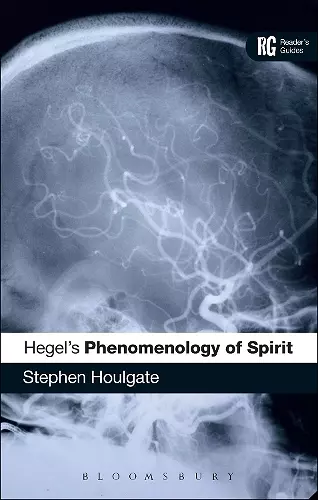Hegel's 'Phenomenology of Spirit'
A Reader's Guide
Format:Paperback
Publisher:Bloomsbury Publishing PLC
Published:8th Nov '12
Currently unavailable, and unfortunately no date known when it will be back

First published in 1801, Hegel's Phenomenology of Spirit has exercised considerable influence on subsequent thinkers, from Marx and Kierkegaard to Heidegger, Kojève, Adorno and Derrida.
Hegel's Phenomenology of Spirit is probably his most famous work. First published in 1807, it has exercised considerable influence on subsequent thinkers from Feuerbach and Marx to Heidegger, Kojève, Adorno and Derrida. The book contains many memorable analyses of, for example, the master / slave dialectic, the unhappy consciousness, Sophocles' Antigone and the French Revolution and is one of the most important works in the Western philosophical tradition. It is, however, a difficult and challenging book and needs to be studied together with a clear and accessible secondary text. Stephen Houlgate's Reader's Guide offers guidance on: Philosophical and historical context Key themes Reading the text Reception and influence Further reading
'Stephen Houlgate is one of the best and most respected Hegel scholars, and this is one of his best books: it is clear, helpful, and shows a deep understanding of Hegel's notoriously difficult text. For anyone seeking to get to grips with the Phenomenology, this will be an indispensable resource.' -- Robert Stern, Professor of Philosophy at the University of Sheffield, UK.
‘Concentrating on reconstructing the underlying logic of Hegel's arguments in the Phenomenology of Spirit, Stephen Houlgate provides an exceptionally clear introduction to this notoriously difficult work. Houlgate's introduction will be especially useful for both students and specialists because it is lucid and concise, yet always remains closely related to the text and rests on impressive scholarship.' -- Alison Stone, Reader in European Philosophy at Lancaster University, UK.
Stephen Houlgate’s guide is undoubtedly based on years of patiently guiding students through the Phenomenology at Warwick University and this pedagogical intent is its great strength and virtue. It concentrates on the first four chapters of Hegel’s book and succeeds admirably in setting out how the logical nature of the arguments unpack themselves. This allows the reader to concentrate on the task of following what Hegel is saying in particular paragraphs without having to grapple with larger questions of interpretation. -- Sean Sheehan * Irish Left Review *
Clear and concise [and] providing crucial insights. -- Jean-Michel Buée, Université de Grenoble I * Archives de Philosophie (Bloomsbury translation) *
ISBN: 9780826485113
Dimensions: unknown
Weight: 272g
232 pages